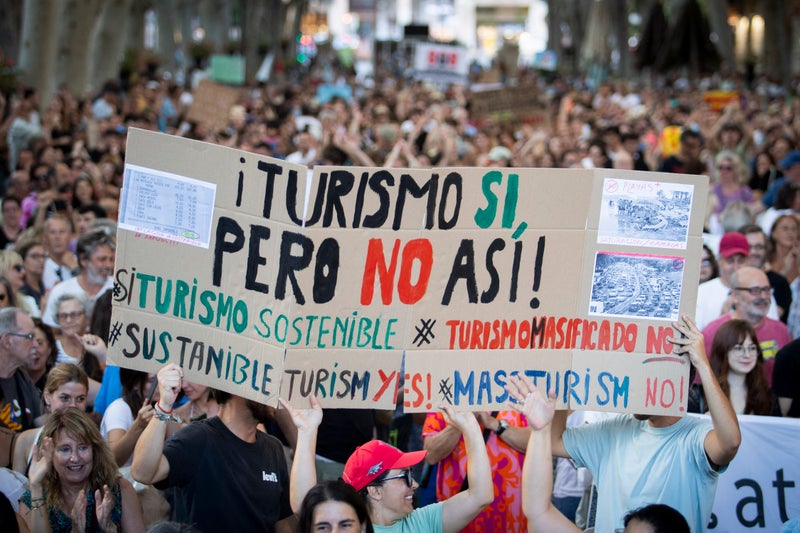New Zealand’s latest tourism campaign has not achieved the effect it was hoping for. Instead, the new tagline, ‘Everyone must go!’ has caused controversy, with many describing it as ‘tone-deaf’ at a time of record emigration and unemployment rates in New Zealand.
![[New Zealand tourism campaign 'everyone must go!']](https://metro.co.uk/wp-content/uploads/2025/02/SEI_240392653-c016.jpg?quality=90&strip=all&w=646)
The marketing ploy launched last weekend on social media and radio and was designed to encourageAustralians – the country’s biggest tourism market – to visit. But the advert, which cost $500,000 (£226,494), has drawn backlash. Critics, including Labour MP Cushla Tangaere-Manuel, have questioned the slogan’s quality and cost.

RNZ, New Zealand’s public media service, shared the campaign on their socials, reporting that residents have been mocking the slogan. ‘Everyone must go? They are going, leaving in droves because they have no work or prospects left here,’ one person commented, while another questioned: ‘How much for that branding?’.
Others said they were embarrassed by the advert, while further commenters suggested it was ‘trying to fill the vacancies made by record Kiwis that left.’. Green Party tourism spokesperson Celia Wade-Brown told RNZ: ‘I think ‘Everyone Must Go’ might refer to the need for toilets in some of our high-tourist spots. I mean, the queues are ridiculous’.
Cushla Tangaere-Manuel, Labour’s tourism spokesperson agreed that it ‘makes New Zealand sound like we’re in a clearance bin at a sale.’. Tangaere-Manuel referred to the ‘many cuts’ taking place across the country, and stated: ‘The irony of that messaging is, that’s how Aotearoa New Zealanders are feeling right now.’ Aotearoa is the Māori name for New Zealand.
However, government officials have been defending the advert. The government has unveiled its new $500,000 ‘Everyone Must Go’ tourism campaign aimed at enticing Australians to pop over the ditch for a visit, but not everyone is convinced the slogan hit the mark.
In a news release, Tourism Minister Louise Upston said: ‘What this Tourism New Zealand campaign says to our Aussie mates is that we’re open for business, there are some great deals on, and we’d love to see you soon.’. Prime Minister Christopher Luxon said he ‘[knows] there’s lots of chat about whether everyone loves the slogan or not.’ But ‘the fact that we’re talking about it is a good thing.’.
The campaign comes at a time of mounting job cuts, high cost of living, and mass relocation. New Zealand’s economy has been struggling in recent years, falling into a technical recession in the third quarter of 2024. HSBC described the country as ‘suffering the biggest hit in the world in 2024’ as interest rates and inflation strained the country’s economy.
Recent data released by Statistics New Zealand revealed that 127,800 people left the country in the 12 months through November. This was a 28% rise compared to last year. These figures also mark the highest number of people leaving the Pacific nation in an annual period at any point in history.
Last year, over 3.3 million tourists visited New Zealand – a 12% increase from 2023. Out of these travellers, 1.2 million were from Australia. Set sail to the Mediterranean in 2025 – here's all you need to know. Private beach clubs, Art Deco delights and the world’s second-largest reef on the ultimate Caribbean cruise.
Top 10 travel brands you need to know about for tour next adventure. TUI is axing flights to three popular holiday destinations in 2025. I went to the world's best hotel and discovered a secret in the basement. In January, New Zealand announced they would relax visa rules to allow digital nomads to work remotely for a foreign employer, in the hope of boosting visitor spending.
Arrow MORE: New Spanish island rule that ‘treats tourists like animals’ divides opinion. Arrow MORE: New sighting of New Zealand ‘bushman’ on the run with his kids. Arrow MORE: Malaga holiday home bookings decline after protests and rumours of ‘tourist ban’.































